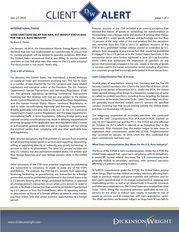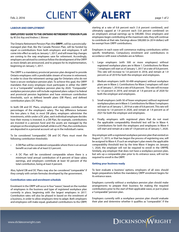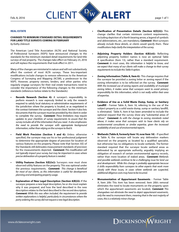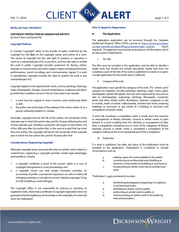Some Sanctions Relief for Iran, But Mostly Status Quo for the U.S. Auto Industry - January 27, 2016
Dickinson Wright
Description
Jan. 27, 2016
CLIENT
comply with the terms of the JCPOA, with the effect that the sanctions
would again restrict previously permitted dealings with Iran. The U.S.
government has indicated that actions permitted before “snap-back”
would not be subject to sanctions. But transactions after “snap-back”
will not be “grandfathered” if they implicate activity for which sanctions
have been re-imposed, notwithstanding any contractual commitment
made before “snap-back”.
Primary sanctions relief is limited to three narrow categories.
The United States took steps to allow exports and reexports to Iran for its commercial passenger aviation sector, as well as imports of Iranianorigin carpets and foodstuffs, including pistachios and caviar. And nonU.S. entities owned or controlled by a U.S.
person were granted limited ability to engage in some transactions involving Iran that are consistent with the JCPOA and U.S. laws and regulations, notwithstanding the general prohibition in the ITSR. With the exception of these three categories, U.S.
persons will continue to be broadly prohibited from engaging in transactions or dealings involving Iran or the Government of Iran. OFAC’s General License H The measures taken to grant limited authorization for U.S. owned or controlled foreign entities to engage in some transactions with Iran are outlined in General License H, issued by the Treasury Department’s Office of Foreign Assets Control (OFAC). General License H permits a U.S.
person to alter operating policies and procedures to accommodate permitted transactions and to make its automated, globally integrated communication and support systems available to foreign entities involved in permitted transactions, provided that the systems operate passively and without human intervention and are not used for any transfer of funds involving the U.S. financial system. Notably, the direct or indirect export, reexport, sale or supply of any goods, technology or services from the United States or by any U.S.
person, wherever located, in connection with these transactions remains prohibited, effectively barring the supply of U.S. origin automotive goods, technology or services directly to Iran or to third countries for incorporation into other items destined for Iran. General License H also expressly confirms that the prohibitions on facilitation by U.S.
persons remain in effect except for the narrow exceptions under the license. This means that U.S. persons may not be involved in the ongoing Iranrelated operations or decision making of a U.S. owned or controlled foreign entity. The license enumerates several categories of transactions that are not authorized for non-U.S.
persons, such as those subject to sanctions regulations other than the ITSR, transactions subject to U.S. export control regulation, funds transfers involving the U.S. financial system, transactions involving designated entities or persons or any Iranian military, paramilitary, intelligence or law enforcement entity, any sanctionable activity related to terrorism, Syria, Yemen, human rights abuse or weapons of mass destruction or their means of delivery, and any activity involving unapproved nuclear procurement channels. ALERT page 2 of 2 Nor have all other secondary sanctions been lifted.
For example, nonU.S. persons remain subject to sanctions for transactions or support involving persons or entities on OFAC’s List of Specially Designated Nationals and Blocked Persons. General License H also confirms that non-U.S.
persons remain subject to the prohibition on the direct or indirect reexport to Iran from a third country of goods, technology or services of U.S. origin that are subject to export control license requirements if the non-U.S. person knows or has reason to know that the reexportation is intended specifically for Iran or the Government of Iran and the goods or technology constitute ten percent or more of the end product’s total value. Where are we now? Despite the publicity surrounding the implementation of the JCPOA, very little has changed for the U.S.
automotive sector. Existing sanctions will continue to impose broad prohibitions on Iranian transactions and the approval, facilitation and evasion provisions of the ITSR will continue to carry substantial risk for corporate groups that include U.S. persons. The possibility that sanctions may “snap back” further limits long term planning.
Considering the broad scope of the Iran sanctions regulations and the limited relief provided, opportunities for U.S. persons will remain severely limited and any proposed transactions involving U.S.-owned or controlled entities must be evaluated with caution and appropriate due diligence and with awareness that strict compliance procedures will be required to avoid violations by U.S. persons. FOR MORE INFORMATION CONTACT: Bruce C. Thelen is a Member in Dickinson Wright’s Detroit office. He can be reached at 313.223.3624 or bthelen@ dickinsonwright.com. This client alert is published by Dickinson Wright PLLC to inform our clients and friends of important developments in the field of international trade.
The content is informational only and does not constitute legal or professional advice. We encourage you to consult a Dickinson Wright attorney if you have specific questions or concerns relating to any of the topics covered here. .
The United States took steps to allow exports and reexports to Iran for its commercial passenger aviation sector, as well as imports of Iranianorigin carpets and foodstuffs, including pistachios and caviar. And nonU.S. entities owned or controlled by a U.S.
person were granted limited ability to engage in some transactions involving Iran that are consistent with the JCPOA and U.S. laws and regulations, notwithstanding the general prohibition in the ITSR. With the exception of these three categories, U.S.
persons will continue to be broadly prohibited from engaging in transactions or dealings involving Iran or the Government of Iran. OFAC’s General License H The measures taken to grant limited authorization for U.S. owned or controlled foreign entities to engage in some transactions with Iran are outlined in General License H, issued by the Treasury Department’s Office of Foreign Assets Control (OFAC). General License H permits a U.S.
person to alter operating policies and procedures to accommodate permitted transactions and to make its automated, globally integrated communication and support systems available to foreign entities involved in permitted transactions, provided that the systems operate passively and without human intervention and are not used for any transfer of funds involving the U.S. financial system. Notably, the direct or indirect export, reexport, sale or supply of any goods, technology or services from the United States or by any U.S.
person, wherever located, in connection with these transactions remains prohibited, effectively barring the supply of U.S. origin automotive goods, technology or services directly to Iran or to third countries for incorporation into other items destined for Iran. General License H also expressly confirms that the prohibitions on facilitation by U.S.
persons remain in effect except for the narrow exceptions under the license. This means that U.S. persons may not be involved in the ongoing Iranrelated operations or decision making of a U.S. owned or controlled foreign entity. The license enumerates several categories of transactions that are not authorized for non-U.S.
persons, such as those subject to sanctions regulations other than the ITSR, transactions subject to U.S. export control regulation, funds transfers involving the U.S. financial system, transactions involving designated entities or persons or any Iranian military, paramilitary, intelligence or law enforcement entity, any sanctionable activity related to terrorism, Syria, Yemen, human rights abuse or weapons of mass destruction or their means of delivery, and any activity involving unapproved nuclear procurement channels. ALERT page 2 of 2 Nor have all other secondary sanctions been lifted.
For example, nonU.S. persons remain subject to sanctions for transactions or support involving persons or entities on OFAC’s List of Specially Designated Nationals and Blocked Persons. General License H also confirms that non-U.S.
persons remain subject to the prohibition on the direct or indirect reexport to Iran from a third country of goods, technology or services of U.S. origin that are subject to export control license requirements if the non-U.S. person knows or has reason to know that the reexportation is intended specifically for Iran or the Government of Iran and the goods or technology constitute ten percent or more of the end product’s total value. Where are we now? Despite the publicity surrounding the implementation of the JCPOA, very little has changed for the U.S.
automotive sector. Existing sanctions will continue to impose broad prohibitions on Iranian transactions and the approval, facilitation and evasion provisions of the ITSR will continue to carry substantial risk for corporate groups that include U.S. persons. The possibility that sanctions may “snap back” further limits long term planning.
Considering the broad scope of the Iran sanctions regulations and the limited relief provided, opportunities for U.S. persons will remain severely limited and any proposed transactions involving U.S.-owned or controlled entities must be evaluated with caution and appropriate due diligence and with awareness that strict compliance procedures will be required to avoid violations by U.S. persons. FOR MORE INFORMATION CONTACT: Bruce C. Thelen is a Member in Dickinson Wright’s Detroit office. He can be reached at 313.223.3624 or bthelen@ dickinsonwright.com. This client alert is published by Dickinson Wright PLLC to inform our clients and friends of important developments in the field of international trade.
The content is informational only and does not constitute legal or professional advice. We encourage you to consult a Dickinson Wright attorney if you have specific questions or concerns relating to any of the topics covered here. .













